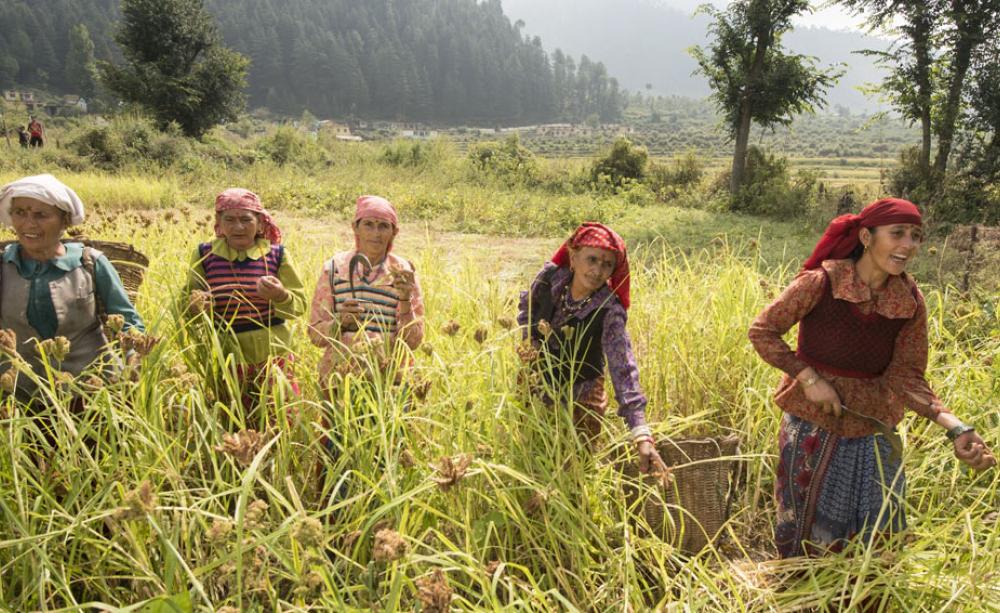Rewilding Food, Rewilding Farming
TRANSCEND MEMBERS, 13 Apr 2020
Prof. Vandana Shiva | The Ecologist – TRANSCEND Media Service
George Monbiot’s recent column, “Lab-grown food will soon destroy farming – and save the planet”, strikes me as a dystopian vision of the future, with no people working the land and humans eating ‘fake’ food produced in giant industrial factories from microbes.
Monbiot concludes in his article: “Farmfree food will allow us to hand back vast areas of land and sea to nature, permitting rewilding and carbon drawdown on a massive scale. Farmfree food offers hope where hope was missing. We will soon be able to feed the world without devouring it.”
Einstein’s famous quote immediately comes to mind – he warned: “We can’t solve problems by using the same kind of thinking we used when we created them”.
Ecological being
The notion that high-tech “farm free” lab food will save the planet is simply a continuation of the same mechanistic mindset which has brought us to where we are today – the idea that we are separate from and outside of nature.
This paradigm evolved with the fossil fuel age of industrial production; it is the basis of industrial agriculture which has destroyed the planet, farmers livelihoods and our health.
Unfortunately, it is also the basis of the author’s vision of the future of food and farming – the total industrialisation of our food and of our lives, which is, as the aphorism ‘we are what we eat’ tells us, the ultimate industrialisation of humans – the final step in ending our earth-centeredness and ecological being.
Turning “water into food” is an echo from the times of the second world war, when it was claimed that fossil-fuel-based chemical fertilisers would produce “Bread from Air”. Instead we have dead zones in the ocean, greenhouse gases – including nitrous oxide which is 300 times more damaging to the environment than CO2 – and desertified soils and land.
We are part of nature, not separate from and outside of nature. Food is what connects us to the earth, its diverse beings, including the forests around us — through the trillions of micro organisms that are in our gut microbiome and which keep our bodies healthy, both inside and out.
Cultural heritage
Eating is an ecological act, not an industrial, mechanical act.
The web of life is a food web. We cannot separate food from life. Likewise, we cannot separate ourselves from the earth.
The problem is not farming, but industrial agriculture. This commodity-based, fossil fuel intensive and chemical intensive industrial food system has contributed 50 percent of the greenhouse gas emissions that are causing climate havoc and threatening agriculture.
It has caused 75 percent of the destruction of soils, 75 percent of the destruction of water resources, and the pollution of our lakes, rivers and oceans; 93 percent of crop diversity has been pushed to extinction through industrial agriculture.
And 75 percent of the chronic diseases that are killing us have their roots in industrial food.
Assuming that this particular, distorted and violent method of farming – which has been imposed on the world over less than a century – is the only way humans have farmed and can farm, reveals a blindness to the diverse cultures and diverse practices of farming, and threatens the cultural heritage of every country in the world.
This passionate promotion of fake food also threatens our connection with the earth and the joy and satisfaction of eating food produced with care and intelligence by fellow beings.
It threatens our wellbeing, our health and the health of the planet by removing small farmers who care for the land and regenerate the earth. Making Lab Food the basis of what we eat brings us closer to a robotic, non-participatory, non-creative and high-tech-based existence which denies the creativity of intelligent life.
Agroecology
The English word “agriculture” comes from a combination of the Latin words agrum (form “ager”, meaning “field, farm, land, estate”) and cultura (“care”, “growing”, “cultivation”), which became ‘agricultura’ (agriculture, farming and, etymologically, care for the land).
Real farming is farming with nature, in nature’s ways, which are the laws of ecology. Real food is a by-product of the economy of care for the land. It protects the life of all beings on earth and also nourishes our health and wellbeing.
“Sensible farm policies” not only exist but are today being practiced around the globe. Agroecology, which encompasses common ecological principles – organic farming, permaculture, biodynamic farming, natural farming regenerative agriculture, among many others – has been recognized as the most effective sustainable and equitable method of farming which also addresses the challenges of feeding the world in an era of climate crises.
Agro-business interests and monopolies along with Government apathy have prevented agroecological farming from becoming the mainstream sustainable system for producing food.
At Navdanya we grow healthy food by conserving biodiversity through abundant pollinators and thriving soil organic matter which draws down carbon and nitrogen. By taking care of the earth we heal the broken carbon and nitrogen cycles that are driving climate change.
Corporate control
We stand at a precipice of a planetary emergency, a health emergency, and a crisis of farmers’ livelihoods.
‘Fake food’ will accelerate the rush to collapse by promoting the industrial model of food and life and the illusion that we live outside nature’s ecological processes. It will further destroy food democracy and increase corporate control over food and health.
Real food gives us a chance to rejuvenate the earth, our health, our food economies, our food freedom and food cultures through real farming that cares for the Earth and people.
Through real food we can decolonise our food cultures and our consciousness. We can remember that food is living and gives us life. Food is the currency of life.
Hope lies not in pursuing the skewed and lifeless industrialized and high-tech system of eating lab-produced fake food, but in returning to Earth Citizenship and becoming part of the Earth’s living cycles, and yes, re-wilding the land, our food and our bodies.
_______________________________________________
 TRANSCEND Member Prof. Vandana Shiva is a physicist, ecofeminist, philosopher, activist, and author of more than 20 books and 500 papers. She is the founder of the Research Foundation for Science, Technology and Ecology, and has campaigned for biodiversity, conservation and farmers’ rights, winning the Right Livelihood Award [Alternative Nobel Prize] in 1993. She is executive director of the Navdanya Trust.
TRANSCEND Member Prof. Vandana Shiva is a physicist, ecofeminist, philosopher, activist, and author of more than 20 books and 500 papers. She is the founder of the Research Foundation for Science, Technology and Ecology, and has campaigned for biodiversity, conservation and farmers’ rights, winning the Right Livelihood Award [Alternative Nobel Prize] in 1993. She is executive director of the Navdanya Trust.
Tags: Agriculture, Farming, Organic food, Right to Food, Seeds, Vandana Shiva
DISCLAIMER: The statements, views and opinions expressed in pieces republished here are solely those of the authors and do not necessarily represent those of TMS. In accordance with title 17 U.S.C. section 107, this material is distributed without profit to those who have expressed a prior interest in receiving the included information for research and educational purposes. TMS has no affiliation whatsoever with the originator of this article nor is TMS endorsed or sponsored by the originator. “GO TO ORIGINAL” links are provided as a convenience to our readers and allow for verification of authenticity. However, as originating pages are often updated by their originating host sites, the versions posted may not match the versions our readers view when clicking the “GO TO ORIGINAL” links. This site contains copyrighted material the use of which has not always been specifically authorized by the copyright owner. We are making such material available in our efforts to advance understanding of environmental, political, human rights, economic, democracy, scientific, and social justice issues, etc. We believe this constitutes a ‘fair use’ of any such copyrighted material as provided for in section 107 of the US Copyright Law. In accordance with Title 17 U.S.C. Section 107, the material on this site is distributed without profit to those who have expressed a prior interest in receiving the included information for research and educational purposes. For more information go to: http://www.law.cornell.edu/uscode/17/107.shtml. If you wish to use copyrighted material from this site for purposes of your own that go beyond ‘fair use’, you must obtain permission from the copyright owner.
